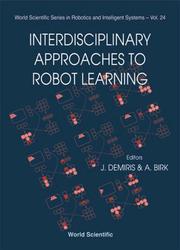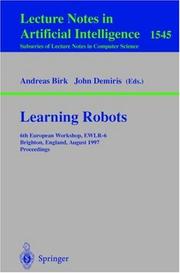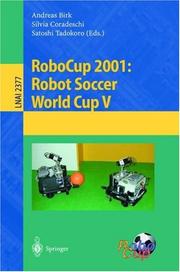| Listing 1 - 3 of 3 |
Sort by
|

ISBN: 128193416X 9786611934163 9812792740 9789812792747 9810243200 9789810243203 Year: 2000 Publisher: Singapore River Edge, N.J. World Scientific
Abstract | Keywords | Export | Availability | Bookmark
 Loading...
Loading...Choose an application
- Reference Manager
- EndNote
- RefWorks (Direct export to RefWorks)
Robots are being used in increasingly complicated and demanding tasks, often in environments that are complex or even hostile. Underwater, space and volcano exploration are just some of the activities that robots are taking part in, mainly because the environments that are being explored are dangerous for humans. Robots can also inhabit dynamic environments, for example to operate among humans, not just in factories, but also taking on more active roles. Recently, for instance, they have made their way into the home entertainment market. Given the variety of situations that robots will be placed in, learning becomes increasingly important. Robot learning is essentially about equipping robots with the capacity to improve their behaviour over time, based on their incoming experiences. The papers in this volume present a variety of techniques. Each paper provides a mini-introduction to a subfield of robot learning. Some also give a fine introduction to the field of robot learning as a whole. There is one unifying aspect to the work reported in the book, namely its interdisciplinary nature, especially in the combination of robotics, computer science and biology. This approach has two important benefits: first, the study of learning in biological systems can provide robot learning scientists and engineers with valuable insights into learning mechanisms of proven functionality and versatility; second, computational models of learning in biological systems, and their implementation in simulated agents and robots, can provide researchers of biological systems with a powerful platform for the development and testing of learning theories.
Robots --- Machine learning. --- Learning, Machine --- Artificial intelligence --- Machine theory --- Robot control --- Robotics --- Control systems. --- 681.3*I26 --- 681.3*I26 Learning: analogies; concept learning; induction; knowledge acquisition; language acquisition; parameter learning (Artificial intelligence)--See also {681.3*K32} --- Learning: analogies; concept learning; induction; knowledge acquisition; language acquisition; parameter learning (Artificial intelligence)--See also {681.3*K32}

ISBN: 3540654801 9783540654803 3540492402 Year: 1998 Volume: 1545 Publisher: Berlin, Heidelberg : Springer,
Abstract | Keywords | Export | Availability | Bookmark
 Loading...
Loading...Choose an application
- Reference Manager
- EndNote
- RefWorks (Direct export to RefWorks)
Robot learning is a broad and interdisciplinary area. This holds with regard to the basic interests and the scienti c background of the researchers involved, as well as with regard to the techniques and approaches used. The interests that motivate the researchers in this eld range from fundamental research issues, such as how to constructively understand intelligence, to purely application o- ented work, such as the exploitation of learning techniques for industrial robotics. Given this broad scope of interests, it is not surprising that, although AI and robotics are usually the core of the robot learning eld, disciplines like cog- tive science, mathematics, social sciences, neuroscience, biology, and electrical engineering have also begun to play a role in it. In this way, its interdisciplinary character is more than a mere fashion, and leads to a productive exchange of ideas. One of the aims of EWLR-6 was to foster this exchange of ideas and to f- ther boost contacts between the di erent scienti c areas involved in learning robots. EWLR is, traditionally, a European Workshop on Learning Robots". Nevertheless, the organizers of EWLR-6 decided to open up the workshop to non-European research as well, and included in the program committee we- known non-European researchers. This strategy proved to be successful since there was a strong participation in the workshop from researchers outside - rope, especially from Japan, which provided new ideas and lead to new contacts.
Robots --- Artificial intelligence --- Control systems --- Mechanical Engineering - General --- Mechanical Engineering --- Engineering & Applied Sciences --- Engineering. --- Computer science --- Artificial intelligence. --- Robotics. --- Automation. --- Robotics and Automation. --- Artificial Intelligence (incl. Robotics). --- Math Applications in Computer Science. --- Mathematics. --- Congresses --- Computer science. --- Artificial Intelligence. --- Informatics --- Science --- AI (Artificial intelligence) --- Artificial thinking --- Electronic brains --- Intellectronics --- Intelligence, Artificial --- Intelligent machines --- Machine intelligence --- Thinking, Artificial --- Bionics --- Cognitive science --- Digital computer simulation --- Electronic data processing --- Logic machines --- Machine theory --- Self-organizing systems --- Simulation methods --- Fifth generation computers --- Neural computers --- Computer science—Mathematics. --- Automatic factories --- Automatic production --- Computer control --- Engineering cybernetics --- Factories --- Industrial engineering --- Mechanization --- Assembly-line methods --- Automatic control --- Automatic machinery --- CAD/CAM systems --- Robotics --- Automation --- Robots - Control systems - Congresses. --- Artificial intelligence - Congresses.

ISBN: 3540439129 3540456031 Year: 2002 Publisher: Berlin, Heidelberg : Springer Berlin Heidelberg : Imprint: Springer,
Abstract | Keywords | Export | Availability | Bookmark
 Loading...
Loading...Choose an application
- Reference Manager
- EndNote
- RefWorks (Direct export to RefWorks)
Robotics --- Artificial intelligence --- Soccer --- Mechanical Engineering - General --- Mechanical Engineering --- Engineering & Applied Sciences --- Computer simulation --- Association football --- English football --- European football --- Football (Soccer) --- Engineering. --- Computer communication systems. --- Software engineering. --- User interfaces (Computer systems). --- Artificial intelligence. --- Pattern recognition. --- Robotics. --- Automation. --- Robotics and Automation. --- Artificial Intelligence (incl. Robotics). --- Computer Communication Networks. --- Software Engineering. --- User Interfaces and Human Computer Interaction. --- Pattern Recognition. --- Football --- Computer science. --- Optical pattern recognition. --- Artificial Intelligence. --- Optical data processing --- Pattern perception --- Perceptrons --- Visual discrimination --- Informatics --- Science --- Computer software engineering --- Engineering --- AI (Artificial intelligence) --- Artificial thinking --- Electronic brains --- Intellectronics --- Intelligence, Artificial --- Intelligent machines --- Machine intelligence --- Thinking, Artificial --- Bionics --- Cognitive science --- Digital computer simulation --- Electronic data processing --- Logic machines --- Machine theory --- Self-organizing systems --- Simulation methods --- Fifth generation computers --- Neural computers --- Communication systems, Computer --- Computer communication systems --- Data networks, Computer --- ECNs (Electronic communication networks) --- Electronic communication networks --- Networks, Computer --- Teleprocessing networks --- Data transmission systems --- Digital communications --- Electronic systems --- Information networks --- Telecommunication --- Cyberinfrastructure --- Network computers --- Automatic factories --- Automatic production --- Computer control --- Engineering cybernetics --- Factories --- Industrial engineering --- Mechanization --- Assembly-line methods --- Automatic control --- Automatic machinery --- CAD/CAM systems --- Automation --- Design perception --- Pattern recognition --- Form perception --- Perception --- Figure-ground perception --- Interfaces, User (Computer systems) --- Human-machine systems --- Human-computer interaction --- Distributed processing
| Listing 1 - 3 of 3 |
Sort by
|

 Search
Search Feedback
Feedback About UniCat
About UniCat  Help
Help News
News